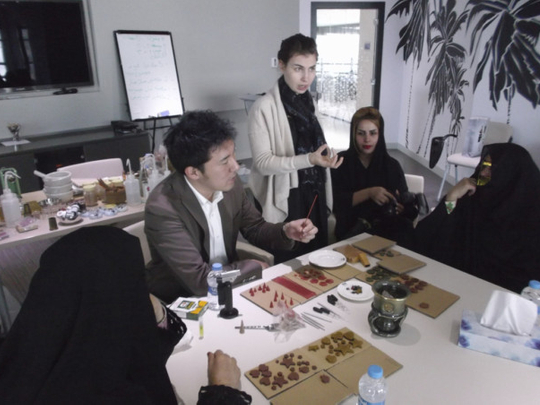
Although incense making has been interwoven with Arabian culture for centuries, Japanese incense experts came to the UAE recently to teach Emirati women how to perfect their ancient craft for a contemporary market.
“By implementing such a project, we hope that the Japanese traditional culture and craft will assist in maximising the quality of the products and craftsmanship in the region,” says Kaori Iijima, International Cooperation Division, International Centre, Organisation for Small and Medium Enterprises and Regional Innovation, Japan (SMRJ).
This independent administrative agency under Japan’s Ministry of Economy, Trade and Industry signed a memorandum of understanding with the Khalifa Fund for Enterprise Development (an independent body of the Abu Dhabi government) in December 2007 to help promote entrepreneurship within small to medium-sized enterprises (SME). Since then the two countries have exchanged information on projects involving training, incubation and branding of products that utilise regional resources.
Sougha, a non-profit initiative under the wing of the Khalifa Fund, finds UAE men and women engaged in crafts including weaving, candle making, leather working, fabric painting and incense making.
About 148 traditional artisans across the UAE are involved in the initiative, which advises and directs them towards making products that can be more readily sold in outlets that Sougha supplies.
Leila Ben-Gacem, Senior Manager, Entrepreneurship Development Department for Khalifa Fund, says, “Many Emiratis practice the art of incense making but it has been suffering from degrading product quality, and, because of big competition, the local industry has a smaller and smaller market share here.
“The incense made is still influenced by Emirati culture but is hoped to be more marketable to a much bigger target audience. This will mean preservation of their craft, a better economic impact on the artists and will keep their heritage alive,” says Ben-Gacem. Currently Sougha is trying to stabilise the quality across artisans’ products and analyse all production costs before deciding the price. “And a new product line will be released next month” she adds.
Transfer of knowledge
Some of Sougha’s women artisans took part in two three-day workshops directed by SMRJ last month. An incense course instructed by Teiji Fujimoto from Shoyeido Incense Company based in Kyoto and a weaving workshop instructed by Naoko Minowa, Japanese dye and weave specialist, was delivered at Dalma Island off the coast of Abu Dhabi.
Small challenges had to be overcome during the incense-making workshop, including the fact that scents preferred by most UAE women differed greatly from Japanese preferences. “I brought several samples from my company in Japan and asked for their opinions but they were not accepted as nice fragrances; they rather chose fragrances not widely liked in Japan,” says Fujimoto.
But it was a joy to witness how “delighted every member participating for the entire three days was when making incense”, he says. “I saw creative efforts by the ladies, such as bringing their own original ingredients from home or using rose water instead of regular water.”
Conversely, Fujimoto learned much about the incense culture of the UAE. “I knew that incense existed among the Arab people, but I did not know too much about it. I learned that regardless of their age, whether male or female, people like to incorporate fragrance into their lives.”
Although not involved directly with any sales aspect, SMRJ supports the Sougha team in sourcing the right materials to produce higher quality products and has market tested these as well as showcased Sougha brand products internationally.
“What we felt strongly through the two workshops is that despite the language barrier, we were able to achieve a heartfelt communication,” says Iijima. “Through the cultural correlations between Japan and Abu Dhabi, we are delighted to see that new products are on their way to entering the market,” she says.
Positive social impact
SMRJ chose to provide support to the Sougha project as it offered many meaningful benefits. “It helps women of the UAE to start businesses and increase participation in the economy. Fostering micro-businesses will bring a positive social impact in creating local industries in areas that had not been commercially active in the past, as well as promoting the succession of traditional cultures to future generations,” she says. “All things considered, we have high expectations for this project in the future.”
Sougha products are sold in Abu Dhabi at the Central Market Souk, Aloft Hotel, Monte Carlo Beach Resort and, on Etihad Airways. In Dubai, these are available at More Café, O’de Rose and Ara Gallery branches.
This year Sougha plans to develop more artisan groups in Delma, Khor Fakkan, Sharjah and Ajman, and will introduce other new product lines in scented candles, camel leather products and jewellery.






